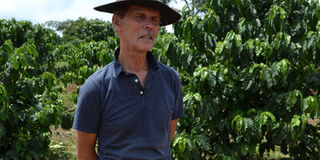Dr Ian Clarke does not regret turning to farming

Dr Ian Clarke in his coffee plantation. Photo by Michael J Ssali
What you need to know:
- Dr Ian Clarke says he plans to transform his farm into a resource centre, where farmers can learn sustainable agricultural practices to combat climate change, improve food security and create jobs, writes Michael J Ssali.
Dr Ian Clarke, former chairman of Makindye Division, has put politics aside for the time being to give more attention to a new enterprise.
He is now a large-scale farmer at Ian Clarke Farm in Kyembogo Sub-county, Kabarole District, in Western Uganda.
Journey into farming
He recently told Seeds of Gold what drove him into farming.
“I noticed that Uganda is gifted with fertile soils and fit for growing a large variety of crops,” he said.
“Yet there are not so many commercial farmers. So, I began looking around for land and finally, just a few years ago, I bought 1,500 acres in this place for that purpose,” he says.
Starting
It is a mixed farm of four enterprises— coffee, maize, poultry, and forestry. The 60—year—old medical doctor began work on the farm about three years ago.
“Farming is not as straining as medical practice because it is easier to lose a crop than to lose a human being. In medicine it is a question of life or death for patients,” says Dr Clarke.
So far he has planted 320 acres of cloned Robusta coffee. “I want to have five hundred acres under coffee and so we are still expanding,” he explained.
He has some 10,000 laying hens and five hundred acres devoted to maize. He has also planted 500 acres of cloned eucalyptus trees. When Seeds of Gold visited, he was hosting the Uganda Coffee Development Authority (UCDA) Board members who were on a coffee production monitoring tour of western Uganda a few weeks ago.
Coffee
“I bought most of my initial coffee seedlings from Kaweri Coffee Estate, but we are preparing our own mother garden for preparing seedlings. I will be purchasing more seedlings, particularly the ones that are resistant to the coffee wilt disease,” says Dr Clarke.
Right now he has to fight the coffee twig borer pest which involves plucking off infected twigs and burning them.
“For as long as the neighbours do not make sufficient effort to fight the pests the problem will take long to disappear,” he said.
At just three years, his coffee plants are heavily laden with coffee cherries. He praised his farm manager, Clivan Asingwire, for ensuring the best agronomic practices. “We control weeds by slashing and spraying. In slopping areas we are careful not to leave the ground bare as this would lead to soil erosion. We have also planted shade trees, which is a good practice in coffee production. We use both organic manure and artificial fertilisers,” he reveals.
The farm has well made roads on which it is possible to drive to all corners during farm inspection. The coffee will be handpicked which he hopes will provide some employment to some people in the neighbouring communities.
“I have a dream to make a Robusta coffee model farm where farmers in the neighbourhood will pick good agronomic practices. I want all the neighbours to turn into Cloned Robusta farmers and it is one of the reasons we want to set up a modern coffee nursery for the interested farmers to come and buy good quality seedlings,” he says before adding, “The idea is for them to produce more good quality Robusta coffee which we can market together as ‘Muhangi Forest Coffee’. We have a forest around here known as Muhangi Forest and it would be a good name for our product. But I will have to ensure that all the farmers pay great attention to appropriate agronomy practices.”
Market
Dr Clarke sells his eggs at farm gate prices in Fort Portal. He also sells maize flour to a number of tea estates and other institutions around Fort Portal.
Manure
The poultry farm is also a big source of manure. “We mix the chicken droppings and the maize combs to make composite which we plough into the soil to keep it fertile,” Dr Clarke explains. “We apply some of the composite manure in the coffee plantation,” adds Dr Clarke the founder of Kiwoko Mission Hospital.
Future plans
He has an irrigation plan. “Right now we are making small rain water reservouirs of between 5,000 and 10,000 litres. We also have some streams flowing through the farm from which water can be pumped,” he says.
“When I get more money I will put up an efficient irrigation system. The farm employs 50 people on permanent terms and many other seasonal employees,” he says.
Who is Dr Ian Clarke
Dr Clarke, who has a house in Fort Portal, finds time to inspect his farm at least once every two weeks. He is the chairman of Kampala International Hospital, and he also has to pay some attention to Clarke International University which is run by his daughter.
Dr Clarke is married to a school teacher and has five children including two adopted ones. He is originally from Ireland but he has acquired Ugandan citizenship.
Value addition
Soon, Dr Clarke will acquire equipment for coffee wet processing so that it can be directly exported overseas.
He has a good reason for choosing to plant cloned eucalyptus trees. “They are strong and grow pretty fast,” he said. “They are three years old now and in four years’ time they will already be good for electricity poles and timber.”
He said coffee farming and forestry, being long term investments, have not yet brought him any money yet but this is made up for by his short term projects, poultry and maize.




